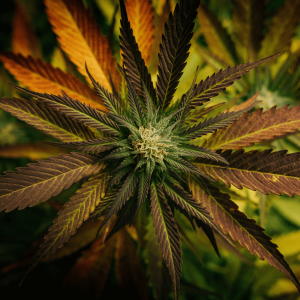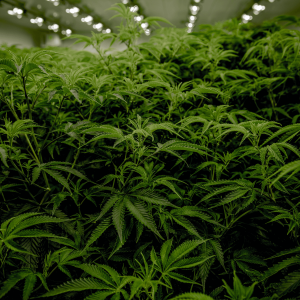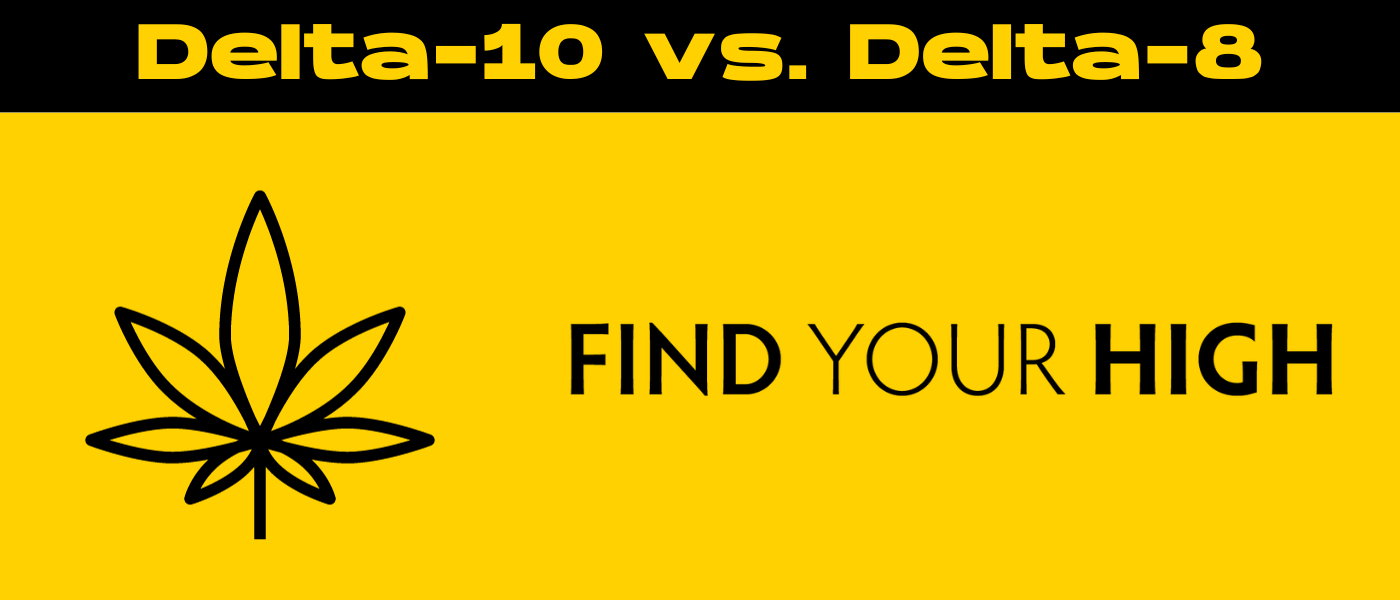In the ever-evolving world of cannabinoids, the buzz around ‘delta 10 vs delta 8 THC’ is gaining a significant amount of attention.
Cannabinoids are a group of chemical compounds present in the cannabis plant that influence the body’s endocannabinoid system and can have varying effects. However, the focus of this discussion lies solely in the comparison between Delta 10 and Delta 8 THC.
So why is this comparison important? Well, it matters due to their differences in chemical and molecular structure and effects on the human body. In this blog, we’ll dive deep into the characteristics, benefits, and side effects of these cannabinoids, giving you a comprehensive understanding of Delta 10 and Delta 8 THC. Let’s get started!
Understanding Delta 8 THC
So here’s the deal: Delta-8 THC, also known as delta-8-tetrahydrocannabinol, is a psychoactive compound found in cannabis plants.
Most notably, it’s an isomer of delta-9-tetrahydrocannabinol, otherwise simply known as ‘THC.’ If you’re unfamiliar, an isomer is a compound with the same chemical formula as another compound, but with a different arrangement of atoms in the molecule as well as different properties.
Delta-8 THC is chemically distinct from other isomers because of the placement of a certain double bond. Its extraction, often from hemp, requires a meticulous refinement process that includes extraction, winterization, and decarboxylation.
Delta-8 has a unique interaction with cannabinoid receptors in our body’s endocannabinoid system (ECS). (Note that the ECS is a complex cell-signaling system that plays a role in regulating various functions.) Delta 8 THC has a strong affinity for the CB1 receptor in the ECS, mainly found in the brain. This interaction brings about its psychoactive effects, though they’re not as potent as those from Delta 9-THC.
Legal Status and Sourcing
The legality of Delta 8 THC can be quite a complex issue. It is, for the most part, legal in many places thanks to the 2018 Farm Bill, which legalized all hemp derivatives, including all cannabinoids, isomers, and other chemical compounds, barring Delta 9 THC. However, the laws can vary from one state to another, so it’s always best to check local regulations. Most Delta 8 THC on the market is sourced from hemp flower, making it more widely available and legal for purchase.
Potential Medicinal Uses
Although research is still in progress, Delta 8 THC has shown promise in various medicinal uses. It’s been associated with beneficial effects such as reducing pain and inflammation, boosting mood and motivation, increasing appetite, and potentially offering neuroprotective benefits.
However, like any other cannabinoid, it’s important to consult with a healthcare provider before using it for medical benefits.

Exploring Delta-10 THC
Delta-10 THC, though not as popular as Delta-8 and Delta-9, is another mind-altering cannabinoid present in cannabis plants.
Nonetheless, its presence in the market has piqued the interest of both consumers and researchers.
Delta-10 THC is chemically similar to Delta-8 THC. However, the double bond is in a different position, giving Delta-10 THC its unique properties.
Even though it looks similar, the extraction process for Delta-10 THC is actually quite different. It’s often created when certain external elements come into play during extraction and refinement, which makes producing it in large amounts more challenging.
The user experiences with Delta-10 THC are mostly based on anecdotal evidence since there is a lack of scientific research. People often mention improved focus, creativity, and energy, which makes it a popular choice for those looking for a productivity boost.
However, just like any other cannabinoid, we’d suggest starting with a low dosage before gradually increasing, while paying close attention to any potential side effects.
Legal Considerations and Availability
The legal status of Delta-10 THC is the same as Delta-8 THC thanks to the 2018 Farm Bill. However, changes in state laws can impact its legal status, so it’s essential to stay informed about local regulations.
Delta-10 THC is also primarily extracted from hemp, enabling its widespread availability.

Comparative Analysis with Delta-8 THC
Delta-10 THC is said to provide a similar yet distinct experience compared to Delta-8 THC.
While they both interact with the CB1 receptors in the ECS, users often describe Delta-10 THC as a more cerebral and less sedative experience, with a heightened focus and creativity.
However, it’s important to remember that individual experiences can vary significantly based on dosage and tolerance.
Delta-10 vs Delta-8: Key Differences
Even though Delta 8-THC and Delta-10 THC share some very similar chemical structures, each has a distinct set of unique characteristics, benefits, and side effects, which contribute to a diverse range of user experiences.
In the next sections, we’ll dig into the nuanced differences between Delta-10 and Delta-8 THC.
We’ll touch on their extraction processes, potential medicinal uses, legal status, and how they affect the human body because by understanding these differences, consumers can make more informed decisions about which compound best suits their needs.
Psychoactive Effects
Delta-8 THC is known to deliver a milder high compared to Delta-9 THC, often described as clear-headed and euphoric.
On the other hand, Delta-10 THC, while still psychoactive, is associated with a more invigorating and focus-enhancing effect, making it a favorite for those seeking a productivity boost.
Potential Therapeutic Benefits
Both Delta-8 THC and Delta-10 THC have shown potential medicinal uses. Delta-8 THC may help reduce pain and inflammation, boost mood, increase appetite, and offer neuroprotective benefits. Delta-10, while less researched, has anecdotal evidence suggesting it may support focus, creativity, and energy.
Side Effects and Safety Concerns
As with all cannabinoids, side effects can occur. However, these are usually found with higher dosages.
Side effects for Delta-8 and Delta-10 can include dry mouth, mild anxiety, or feeling drowsy. Delta-8 THC’s side effects are typically less severe than Delta-9 THC’s, while Delta-10 THC is considered to have a similar safety profile to Delta-8 THC.
Always consult a healthcare provider before starting a regimen with these cannabinoids.
Consumption Methods and Dosages
Both Delta-8 and Delta-10 THC are available in various forms, including tinctures, edibles, vape cartridges, and more. Dosage will largely depend on the individual’s tolerance and the desired effects.
Typically, it’s a good idea to begin with a small dose and slowly increase it until you experience the desired effects.

Legal Landscape
Just like other cannabinoids, the legal status of Delta-8 and Delta-10 THC is influenced by federal and state laws.
Even though the 2018 Farm Bill made hemp and its derivatives legal (except for Delta-9 THC), the status of Delta-8 and Delta-10 THC is still a bit hazy because it depends on whether the cannabinoids come from hemp or the marijuana plant.
On top of that, there are legal challenges like the DEA’s interim rule that considers all synthetically derived tetrahydrocannabinols as Schedule I substances.
The cannabis industry faces a lot of hurdles due to this uncertainty, which could hinder innovation and limit access for users. But as the industry progresses, there’s hope for clearer regulations that prioritize transparency, safety, and growth.
User Experiences
When it comes to choosing between Delta-8 and Delta-10 THC, everyone’s experiences and preferences can be different.
If you’re after a mellow, euphoric high that helps with anxiety and brings a sense of calm, Delta-8 THC is often the way to go. On the other hand, if you’re looking for an energizing, focus-boosting experience, Delta-10 THC might be more up your alley. It’s a popular choice for those who want to enhance creativity and productivity without feeling too sleepy.
Remember though, the effects of these cannabinoids can vary from person to person. Factors like your tolerance, dosage, and consumption method can all affect your experience. Start with a low dose, increase gradually, and keep an eye out for any potential side effects.

Medical Perspectives
As we dig deeper into the medical perspectives, it’s important to note that expert opinions on Delta-8 and Delta-10 THC are mostly positive, yet cautious.
Medical professionals recognize the potential medical benefits of medical marijuana but stress the need for more comprehensive and rigorous scientific research. However, the current research shows promising results for conditions like chronic pain relief, anxiety, and appetite stimulation.
We think it’s worth mentioning that much of the research on THC compounds like Delta-8 and Delta-10 is still in the early stages, and we need more extensive clinical trials to fully understand their therapeutic potential. Further studies are necessary to explore long-term effects, interactions with other medications, and potential side effects with extended use.
The Risks of Delta-8 THC and Delta-10 THC
While Delta-8 and Delta-10 THC have been praised for their potential health benefits, there are also risks associated with their consumption.
It’s crucial to approach these compounds with an awareness of the possible adverse effects, interactions with medications, and long-term health implications.
Possible Adverse Effects
- Both Delta-8 and Delta-10 THC can cause side effects such as dry mouth, mild anxiety, and drowsiness, especially at higher doses.
- Much like other cannabinoids, these compounds may also result in temporary changes in perception, mood, consciousness, and behavior.
- Overconsumption might lead to more critical symptoms, including confusion, hallucinations, panic attacks, and even loss of consciousness.
Interactions with Medications
- Delta-8 and Delta-10 THC may interact with a range of medications, altering their effectiveness or resulting in unwanted side effects.
- Specifically, they may interact with drugs that are metabolized by the liver, as they can inhibit certain liver enzymes.
- It’s vital to consult a healthcare provider if you’re taking any medication, particularly for conditions such as blood pressure, diabetes, and heart disease, before starting a regimen with these cannabinoids.
Long-term Health Implications
- The long-term effects of Delta-8 and Delta-10 THC consumption are not yet fully understood due to the lack of extensive research.
- Prolonged use may potentially result in tolerance build-up, requiring larger doses to achieve the same effects, which could increase the risk of adverse effects.
- There are concerns about the potential for dependency or addiction over time, although more research is needed to confirm these risks.
- Long-term use may also have unknown effects on mental health and cognitive function.

Summary
To sum it up, Delta-8 and Delta-10 THC are two cannabinoids found in the cannabis plant that have gained a lot of attention for their unique effects and potential medical benefits. They do share some side effects like dry mouth, anxiety, and drowsiness, but each one offers its own experience.
Delta-8 THC is known for its calming effects and euphoric high, while Delta-10 THC is more energizing and helps with focus. But remember, it’s important to consider your personal needs, tolerance, and any potential interactions with medications before choosing between these substances.
The cannabis world is always evolving, with legal challenges and ongoing research adding complexity. It’s an exciting time, but we should also be cautious as we don’t fully understand the long-term effects of these compounds yet.
So, if you’re interested, stay informed, start with a low dose, and always prioritize safety.
Frequently Asked Questions
1. Which Delta is best for anxiety?
Delta-8 THC is often suggested for those dealing with anxiety. Its calming and euphoric effects make it a popular choice for users looking to ease anxiety symptoms. However, everyone’s experience may differ, so it’s important to start with a low dose and keep an eye on how you react.
2. Can you fly with Delta-10?
The legality of traveling with Delta-10 THC depends on the laws of the departure and arrival locations. Although the 2018 Farm Bill legalized hemp-derived cannabinoids, some states in the U.S. still have restrictions. Always check local and federal laws before traveling with any cannabis products.
3. Is Delta-9 stronger than Delta-8?
Delta-9 THC is generally considered to have more potent psychoactive effects compared to Delta-8 THC. Users typically report more intense experiences with Delta-9, such as mild euphoria and altered perception. However, Delta-8 is favored by some for its milder, less anxiety-inducing high.
4. Will Delta-8 test positive?
Yes, Delta-8 THC can result in a positive drug test. Standard drug tests are designed to detect the presence of THC, and they do not differentiate between different forms of THC, including Delta-8 and Delta-9.
If you are subject to drug testing, please consider this before using Delta-8 products.

 Rewards
Rewards




